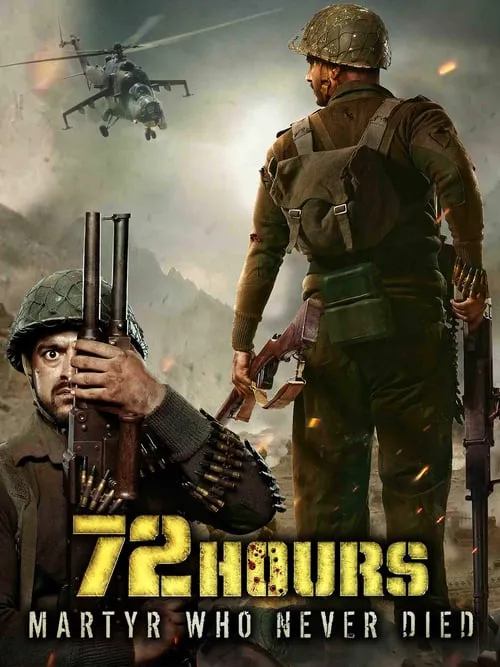72 Hours: Martyr Who Never Died

Plot
72 Hours: Martyr Who Never Died is a 2019 Indian drama film directed by Avinash Das. The film is based on the true story of Rifleman Jaswant Singh Rawat, a soldier from 4th Garhwal Rifles who stood alone in his battle against the Chinese army during the Indo-China war in 1962. The film begins with the events leading up to the war. The Indo-China border has been tense for quite some time, with both nations engaged in a series of skirmishes and battles. However, the international community is largely oblivious to the gravity of the situation, and the Indian government is caught off guard when the Chinese suddenly launch a massive invasion of the country's northern territories. Rifleman Jaswant Singh Rawat, a 22-year-old soldier from the state of Uttrakhand, finds himself at the forefront of the battle for the Nurunaang Base in Arunachal Pradesh, then known as NEFA. Despite being vastly outnumbered, Jaswant stands firm, determined to defend his country and its people. His actions are soon noticed by his commanding officer, Lieutenant Bal Krishna, who is impressed by his bravery and unwavering commitment to duty. As the Chinese continue their advance, the Indian army is forced to retreat, leaving behind a small contingent of soldiers, including Jaswant. However, instead of retreating with his comrades, Jaswant chooses to stay behind and guard the Nurunaang Base, single-handedly holding off against the advancing Chinese troops. Despite being outgunned and outmanned, Jaswant fights valiantly, using guerrilla tactics and his knowledge of the terrain to inflict significant casualties on the enemy. His bravery and determination inspire the local villagers, who come to regard him as a martyr and a hero. Meanwhile, back in India, the news of Jaswant's heroics slowly begins to make headlines, with the government and media hailing him as a national hero. However, the film also explores the more personal aspects of Jaswant's story, including his close relationship with his fellow soldiers and his struggles with the moral implications of war. As the days turn into weeks, Jaswant's supplies begin to dwindle, and he finds himself facing increasingly desperate situations. Despite this, he remains steadfast, convinced that his actions will ultimately turn the tide of the war and help India reclaim its territory. Tragically, Jaswant's bravery comes at a great cost. In a final, desperate bid to hold off the enemy, he is struck by a hail of bullets and falls to the ground. However, rather than dying immediately, Jaswant uses his last ounce of strength to drag himself to a nearby cave, where he spends his final moments writing a letter to his family, expressing his love and gratitude for his time with them. The film ends with Jaswant's funeral, attended by thousands of villagers and fellow soldiers. Despite the sadness of his passing, the film leaves viewers with a sense of hope and pride, knowing that one man's bravery and sacrifice inspired a nation and changed the course of history. Through its portrayal of Rifleman Jaswant Singh Rawat's heroism, 72 Hours: Martyr Who Never Died is a powerful tribute to the men and women who have made the ultimate sacrifice for their country. The film is also a testament to the enduring spirit of the Indian people, who have faced unimaginable challenges throughout their history, but have always emerged stronger and more united in their quest for freedom and self-determination.
Reviews
Recommendations


